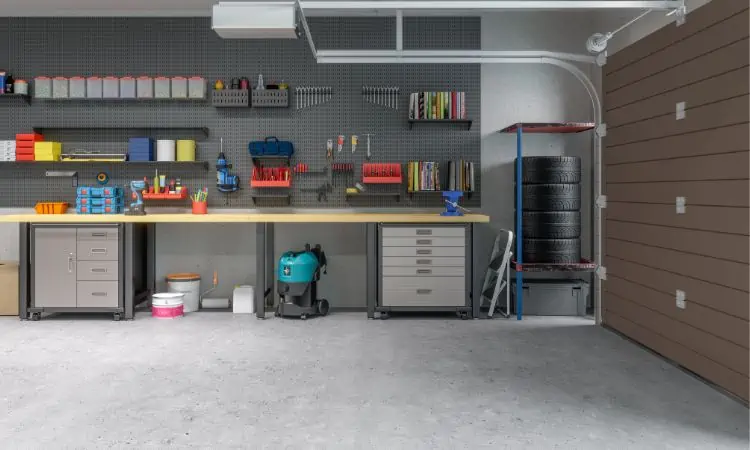Having an air compressor in the garage is not only convenient and useful, but it’s almost a requirement if you do or plan on doing any small projects around the house. An air compressor is an investment like any other. And like many investments, it can help save you time and money while also providing you with plenty of opportunities to get stuff done! But deciding on the right size compressor for your home garage is easier said than done.
The best size air compressor for your home garage depends on what you’ll be using it for. Automotive work will require a larger and more powerful compressor than the odd small project or inflation needs. For the best all-around size, a compressor in the 10-gallon range is ideal for most home garages.
However, it’s important that you take the time to decide on the right compressor for your specific needs. But how do you go about doing that? Fear not. We’re here to walk you through it. Let’s get started.
Table of Contents
- CFM is Key
- Air Compressor Size Matters — Sometimes
- Portability
- Consider Noise Levels
- Type of Air Compressor
- Best Air Compressor for a Home Garage
- Conclusion
- Best Size Air Compressors For Home and Garage FAQ’s
CFM is Key
By far the most important factor you’ll need to consider when searching for an air compressor is CFM. This means Cubic Feet per Minute and is the measure of flow that a compressor can provide. All air tools have clear CFM requirements, which is why this factor is so important. If you buy a compressor that doesn’t provide adequate airflow to the tool, you won’t be able to use that tool as intended.
Consider PSI
PSI, or Pounds per Square Inch, is another factor to consider when looking at air compressors. However, since most air compressors deliver adequate PSI for the majority of air tools, you don’t need to dwell on this. Focus on CFM first and PSI second.
Air Compressor Uses
CFM and PSI dictate air compressor uses. So you’ll want to think about what exactly you’ll be using your air compressor for in your home garage. This will help you determine the right size compressors. Let’s look at some examples to give you an idea of what we’re talking about.
- Inflating Tires, Sports Equipment, and Mattresses – If your main reason for getting an air compressor is to inflate your bike/car tires, pump up your basketball, or fill rafts/air mattresses, then you don’t need a large compressor. Small ones in the 1- to 6-gallon range will work just fine for you.
- DIY Projects – Things like upholstering furniture with a pneumatic stapler, installing trim with a nail gun, or cleaning tight spaces require a slightly larger compressor in the 4- to 8-gallon range.
- Automotive Work – If you plan on using the compressor to operate automotive tools like impact wrenches, you’ll need a larger, more powerful compressor that’s over 10 gallons.
- Painting and Sanding – Painting and sanding with a compressor are two things that require high CFM and near-continuous airflow. This means you’ll need a large compressor that won’t be constantly turning on and off to keep up with your airflow needs. These compressors generally fall in the 20- to 40-gallon range.
Air Compressor Size Matters — Sometimes
We talk about air compressors in terms of size quite a bit. However, this isn’t the most important thing — usually. That is to say, if you just need a compressor to fill the odd tire and to run a brad nailer from time to time, you don’t need a big tank. However, if you’re going to be using tools that require continuous airflow, like sanders or paint guns, you’ll need a larger tank.
The reason for this, if you hadn’t already gleaned it, is how much air these tools use. A brad nailer doesn’t use much air, and it only uses one spurt for every nail. This means you can do a lot of nailing on one small tank of air.
A paint gun, on the other hand, uses a lot of air continuously. And while you could conceivably use a relatively small air compressor to operate a paint gun, it would run out of air quickly, so you would need to wait for the tank to refill to finish the job. Which can be bad if you’re in the middle of painting a car or a wall.
Portability
Next up on the list of considerations for a home garage air compressor is portability. Obviously, if you need a particularly large compressor — say between 60 and 80 gallons — chances are it won’t be portable. But since most people won’t need such large compressors for their home garages, you will probably have your pick of portable compressors.
How portable you want to get depends on whether you’ll be taking your compressor with you out of the garage. Many larger compressors on the market have wheels while others are small enough to be carried around in the trunk of your car or the back of your truck.
You’ll want to strike a balance in a compressor that you’ll be transporting often. You’ll want it to be big enough for your needs and small enough that it won’t give you a backache to carry around.
Consider Noise Levels
If you’ve ever been around an air compressor, you know that they’re definitely not quiet. However, some are much louder than others. And if you’ll be using the compressor mostly in your garage, you’ll probably want to get one that’s as quiet as possible.
Luckily, many air compressors make “quiet” versions in nearly every size. Of course, if you think noise will be a problem for you, there’s always earplugs. Although this won’t do much for those around you or in the neighborhood if you have a particularly loud compressor.
Since low noise levels are such a big selling point, “quiet” compressors will often say as much in the description, so you don’t have to look too hard for one that’s designed to emit low decibels.
Type of Air Compressor
There are several types of air compressors to choose from. Even among compressors of the same size, you’ll have your choice of different styles, each of which has its own benefits. These sizes include:
- Pancake
- Hotdog
- Twin-Stack
- Vertical
If you have limited room in your garage, you’ll want to carefully consider each of these different types to find one that will save you as much space as possible. Pancake compressors are squat and round and can fit easily under a workbench. Hotdog compressors are thin but long. Twin-stack compressors tend to be bulky and close to cube-shaped. Vertical compressors generally have small footprints but tend to be taller than other compressors.
Oil or Oil-Free
While on the subject of types of air compressors, let’s touch on the two kinds of pumps: oil-lubricated or oil-free. Most compressors for home use are made with oil-free pumps, but if you need a larger, more powerful compressor, you will probably have your choice between oil and oil-free.
Oil-free compressors are great because they don’t require you to worry about changing or adding oil at any point. In this sense, they’re maintenance-free. However, oil-lubricated compressors supposedly last longer than oil-free models. This is difficult to measure, and likely not a deciding factor for most people.
If you foresee running your compressor a lot — hours a day, five days a week — then you may want to invest in an oil-lubricated model. If not, it’s probably better to have an oil-free air compressor.
Best Air Compressor for a Home Garage
Now that we’ve covered the major factors to consider, we’ve got an overall recommendation for you. This Stealth Ultra Quiet 12-Gallon Air Compressor is powerful enough to tackle big jobs and small enough to not take up a ton of space in the garage. It offers 4.0 CFM @ 90 PSI and 5.0 CFM @ 40 PSI, making it ideal for use with a wide range of air tools. The 150 PSI, 12-gallon tank will ensure that you don’t run out of air in the middle of a job, and the oil-free pump makes for low maintenance.
The working noise level is only 68 decibels, making it one of the quietest in the business. It’s not the most portable option, but it has wheels and a handle so you can wheel it around the garage. It’s made out of high-quality steel and comes with a built-in safety valve to keep you safe while working. It features a 1.5 HP induction-type motor for quick recovery times and efficiency. It features a 50% duty cycle, meaning it runs for half of its total cycle.
This is definitely not the cheapest air compressor on the market, but it does come with a limited lifetime warranty, which is unheard of among other major air compressor manufacturers. This, coupled with the quiet operation, makes it an investment that can’t be beaten.
Our Recommendation
Features
- 150 Max PSI
- 4.0 CFM @ 90 PSI and 5.0 CFM @ 40 PSI
- 12 Gallon Tank
- 50% Duty Cycle
- High-Quality Steel Construction
- Limited Lifetime Warranty
- Quiet Operation – Only 68 Decibels
- Wheels and Handle for Transport
- Roll-Cage Design for Job Site Protection
- Oil-Free Pump
- Good for Use with a Variety of Air Tools
Conclusion
While the compressor above is our recommendation, you should take the time to research if it’s right for you. The best air compressor for your home garage is one that will power your air tools while giving you the best bang for your buck. Use the factors above to determine what compressor is best for you!
Best Size Air Compressors For Home and Garage FAQ’s
What types of air compressors are suitable for home garages?
There are two main types of air compressors for home garages: portable and stationary. Portable air compressors are lightweight and easy to move, while stationary air compressors are larger and provide a more powerful air supply.
What is the tank capacity of an air compressor?
The tank capacity of an air compressor refers to the volume of compressed air it can hold. The size of the tank determines how much pressurized air is available at any given time.
What are some important features to consider when choosing an air compressor?
Some important features to consider when choosing an air compressor include the type of compressor (piston or rotary), tank size, power source (electric or gas), horsepower, air pressure, and air flow.
What are some popular brands of air compressors for home garages?
Some popular brands of air compressors for home garages include California Air Tools, Dewalt Pancake Air Compressor, and ultra quiet air compressors.
Why is an air filter important for an air compressor?
An air filter is important for an air compressor because it helps to prevent dust and debris from entering the compressor and damaging the pump.
How can I ensure my air compressor runs smoothly in cold weather?
To ensure your air compressor runs smoothly in cold weather, use an oil lubricated pump, keep the compressor tank full, and use a ball drain valve to remove any condensation that may build up. You may also want to consider a compressor designed for cooler running temperatures, such as hot dog compressors.



